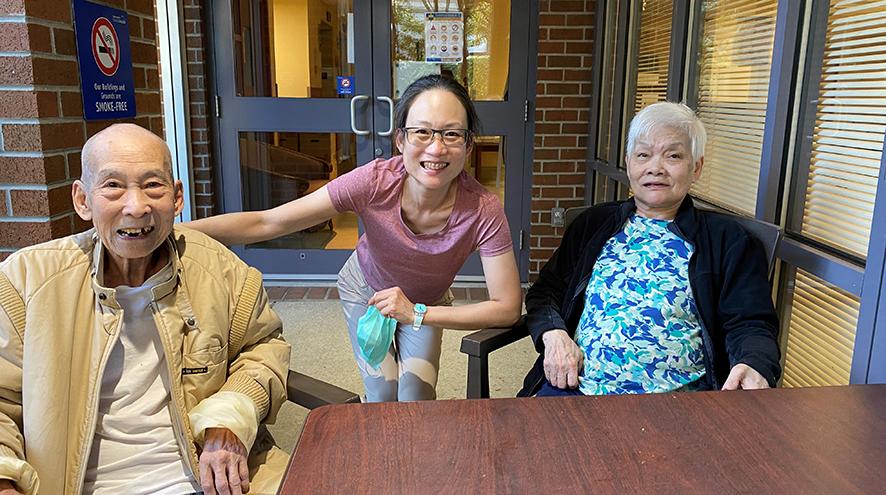Don't change: Joanna Cheng's story
Meet one of the British Columbians sharing their stories as part of Alzheimer’s Awareness Month 2022.

Throughout January, the Alzheimer Society of B.C. is recognizing Alzheimer’s Awareness Month by highlighting the experiences of British Columbians affected by dementia to say, “Don’t change. Even if they do.” For many people living with dementia and their caregivers, the dementia journey can feel very isolating. However, sustaining relationships is essential for the well-being of people facing the disease, whether they live in the community or in long-term care.
This year, British Columbians are sharing their experiences and thoughts on the value of staying connected to people in their lives who are affected by the disease, whether they’re living with dementia or caring for someone who is. Among them is Joanna Cheng, a caregiver from Burnaby, B.C.
"It all started on the day my mom fainted," says Joanna Cheng, recalling how her family first began to suspect her mother, Bo Fong, was living with dementia. When they were at the emergency room, the doctor noted Bo Fong’s possible memory loss. That led Joanna to recognize other behaviours that pointed to dementia. Putting all the pieces together, Joanna took Bo Fong to a geriatrician for diagnosis. After multiple brain scans and tests, Bo Fong was diagnosed with Alzheimer's disease in 2009.
The Cheng family felt a variety of emotions after the diagnosis. Joanna and her siblings found it difficult to accept their mother was living with dementia and they were uncertain how to take care of Bo Fong effectively. But they also felt relieved to have the reason underlying Bo Fong's unusual behaviours confirmed.
At Alzheimer Society of B.C. education workshops, Joanna got practical tips and strategies to help her communicate with her mother. She also learned how to find additional resources.
"How can we support you?" may be a simple question, but the care behind this question is meaningful to caregivers. For Joanna, the routine follow-up calls with the Society helped to alleviate some of the stress she felt as a caregiver.
"Having someone who truly understands your situation and feelings is especially valuable, and I know I am not walking alone in this journey," Joanna says.
In January 2020, Bo Fong moved into a long-term care home because the family felt it was no longer possible to keep her safe at home. COVID-19 began soon afterwards. Like many others, the pandemic challenged the family’s ability to stay connected. Bo Fong had fewer opportunities to interact with others in the care home; as a result, her situation deteriorated quickly. She no longer recognized Joanna and her siblings.
Meanwhile in 2020, Joanna's father also showed symptoms of dementia. Because of Bo Fong's experience, the Cheng family was better prepared. "We knew what was ahead of us and how to cope with the situation," she says. Joanna's parents currently live in the same long-term care home where she can visit regularly. Despite not remembering her children, Bo Fong nevertheless recalls some fond memories. Joanna has found a way to connect with her parents by talking about these memories with them. "When mom actually remembers, it makes her happy," Joanna reflects.
The Lunar New Year is coming next month, and Bo Fong’s care home will organize arts and crafts activities for its residents. Joanna will also bring food to celebrate the traditional holiday with her “ma bou,” a name she calls her parents, which means “precious twin” in Chinese. To her, it is most important to cherish their time together.
Learn more about the campaign
Want to learn more? Read some of the other stories being shared throughout the month and visit dontchange.ca to learn more.
請按此閲讀中文版本。
